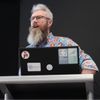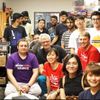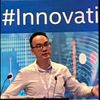Schedule
Thursday, 19th Mar
FOSSASIA Summit 2020 - Towards a Sustainable Society![]()
![]()
Kiruthika Ramanathan (Senior Manager Science Centre Singapore), Roland Turner (OpenTech Summit Organising Team | Chief Privacy Officer FOSSASIA | TrustSphere)
Talk
- Kiruthika Ramanathan (Senior Manager Science Centre Singapore), Roland Turner (OpenTech Summit Organising Team | Chief Privacy Officer FOSSASIA | TrustSphere)
- Talk
Lecture Theatre
Thursday, 19th Mar, 10:00 - 10:10
- Open Tech Main Track
Continuous Integration for Sustainable Hardware Production in the Automotive Industry![]()
Mario Behling ( OpnTec GmbH)
Talk
- Mario Behling ( OpnTec GmbH)
- Talk
Lecture Theatre
Thursday, 19th Mar, 10:40 - 11:00
- Hardware & Firmware
Panel: Creating a Sustainable World through Open Source and Lifelong Learning![]()
![]()
![]()
![]()
Harish Pillay ( Red Hat), Lim Tit Meng ( CEO Science Centre Singapore), Tat Suan Koh (Dr) ( Ori9in), Roland Turner (OpenTech Summit Organising Team | Chief Privacy Officer FOSSASIA | TrustSphere)
Panel Discussion
- Harish Pillay ( Red Hat), Lim Tit Meng ( CEO Science Centre Singapore), Tat Suan Koh (Dr) ( Ori9in), Roland Turner (OpenTech Summit Organising Team | Chief Privacy Officer FOSSASIA | TrustSphere)
- Panel Discussion
Lecture Theatre
Thursday, 19th Mar, 11:20 - 12:00
- Open Tech Main Track
Be The Leader You Need [Online]![]()
Megan Byrd-Sanicki (Open Source Strategist Google)
Talk
- Megan Byrd-Sanicki (Open Source Strategist Google)
- Talk
Open source crossed the chasm into mainstream with users in all industries. Maintaining the users’ trust and sustaining innovation is key to open source’s success.
However, in a world where communities are passionate, multicultural, and primarily use online communication, it is challenging to move communities towards a shared vision in a frictionless, sustainable way. Community challenges can impact innovation, putting user adoption at risk and even more importantly, hurting community members.
Stronger open source leadership can address these challenges and there is a call for more leaders in every project. Good news! Every contributor is a leader either through self leadership, leading others, or leading the community, yet most people have never been trained on how to lead.
This talk provides the leadership the training you need and covers:
- Why strengthen community leadership
- Key leadership and emotional intelligence principles
- Practical ways to lead as a contributor
Lecture Theatre
Thursday, 19th Mar, 12:00 - 12:30
- Internet, Society, Community
The critical importance of use-neutrality in F/OSS licensing![]()
Roland Turner (OpenTech Summit Organising Team | Chief Privacy Officer FOSSASIA | TrustSphere)
Talk
- Roland Turner (OpenTech Summit Organising Team | Chief Privacy Officer FOSSASIA | TrustSphere)
- Talk
Lecture Theatre
Thursday, 19th Mar, 13:30 - 14:00
- Compliance & Legal
MLflow: A Machine Learning Lifecycle Platform![]()
Ben Sadeghi (Partner Solutions Architect Databricks)
Talk
- Ben Sadeghi (Partner Solutions Architect Databricks)
- Talk
Ben Sadeghi is a Partner Solutions Architect at Databricks, covering Asia Pacific and Japan, focusing on Microsoft and its partner ecosystem. Having spent several years with Microsoft as a Big Data & Advanced Analytics Technology Specialist, he has helped various companies and partners implement cloud-based, data-driven, machine learning solutions on the Azure platform.
Prior to Databricks and Microsoft, Ben was engaged as a data scientist with Hadoop/Spark distributor MapR Technologies (APAC), developed internal and external data products at Wego, a travel meta-search site, and worked in the Internet of Things domain at Jawbone, where he implemented analytics and predictive applications for the UP Band physical activity monitor. Before moving to the private sector, Ben contributed to several NASA and JAXA space missions.
Ben is an active member of the open-source Julia language community. He holds an M.Sc. in computational physics, with an astrophysics emphasis.
Lecture Theatre
Thursday, 19th Mar, 14:00 - 14:30
- Artificial Intelligence
Open Vision Computer - An open source ROS based vision system![]()
Luca Della Vedova (Embedded Systems Engineer Open Source Robotics Corporation)
Talk
- Luca Della Vedova (Embedded Systems Engineer Open Source Robotics Corporation)
- Talk
Lecture Theatre
Thursday, 19th Mar, 14:30 - 15:00
- Hardware & Firmware
Open Source Robotics Middleware Framework for Healthcare![]()
Morgan Quigley (Chief Architect Open Robotics )
Talk
- Morgan Quigley (Chief Architect Open Robotics )
- Talk
Lecture Theatre
Thursday, 19th Mar, 15:20 - 15:50
- Open Tech Main Track
Privacy and Decentralisation with Multicast![]()
Brett Sheffield ( Librecast Project)
Extended Talk
- Brett Sheffield ( Librecast Project)
- Extended Talk
Lecture Theatre
Thursday, 19th Mar, 15:50 - 16:30
- Internet, Society, Community
Friday, 20th Mar
How cloud-native applications are helping organisations stay ahead of cybersecurity threats [Online]![]()
Jerome Walter (Field Chief Information Security Officer, APJ, Modern Applications Platform Business Unit (MAPBU) VMware)
Talk
- Jerome Walter (Field Chief Information Security Officer, APJ, Modern Applications Platform Business Unit (MAPBU) VMware)
- Talk
Event Hall 2-1
Friday, 20th Mar, 10:00 - 10:30
- Cloud, Containers, DevOps
ko - zero-config tool for deploying Go app on k8s![]()
Stanley Nguyen (Software Engineer Xendit)
Talk
- Stanley Nguyen (Software Engineer Xendit)
- Talk
Event Hall 2-1
Friday, 20th Mar, 10:30 - 11:00
- Cloud, Containers, DevOps
Speed Up Your Data Processing: Parallel and Asynchronous Programming in Python![]()
Chin Hwee Ong (Data Engineer ST Engineering)
Talk
- Chin Hwee Ong (Data Engineer ST Engineering)
- Talk
Training Room 2-1
Friday, 20th Mar, 10:30 - 11:00
- Python
High Performance Location-based Restaurant Campaigns in Foodpanda [Online]![]()
Johannes Ridho Tumpuan Parlindungan (Software Engineer Foodpanda/Delivery Hero Singapore)
Talk
- Johannes Ridho Tumpuan Parlindungan (Software Engineer Foodpanda/Delivery Hero Singapore)
- Talk
Training Room 2-2
Friday, 20th Mar, 10:40 - 10:50
- Web Technologies
AR/VR for 2020 [Online]![]()
Satoshi Goto (Tech Lead, Senior Software Engineer Rakuten )
Talk
- Satoshi Goto (Tech Lead, Senior Software Engineer Rakuten )
- Talk
Training Room 2-2
Friday, 20th Mar, 11:00 - 11:30
- Web Technologies
Koalas: Easy Transition from Pandas to Spark![]()
Ben Sadeghi (Partner Solutions Architect Databricks)
Talk
- Ben Sadeghi (Partner Solutions Architect Databricks)
- Talk
Pandas, the de-facto standard DataFrame implementation in Python, is very popular among data scientists, but it does not scale well to big data. It was designed for small data sets that a single machine could handle. On the other hand, Apache Spark has emerged as the de-facto standard for big data workloads. Today many data scientists use Pandas for coursework, pet projects, and small data tasks, but when they work with very large data sets, they either have to migrate to PySpark to leverage Spark or downsample their data so that they can use pandas.
Now with Koalas, an open-source implementation of the Pandas API on Apache Spark, data scientists can make the transition from a single machine to a distributed environment without needing to learn a new framework. In this talk, we'll go through the basics of Koalas, along with demos.
Ben Sadeghi is a Partner Solutions Architect at Databricks, covering Asia Pacific and Japan, focusing on Microsoft and its partner ecosystem. Having spent several years with Microsoft as a Big Data & Advanced Analytics Technology Specialist, he has helped various companies and partners implement cloud-based, data-driven, machine learning solutions on the Azure platform.
Prior to Databricks and Microsoft, Ben was engaged as a data scientist with Hadoop/Spark distributor MapR Technologies (APAC), developed internal and external data products at Wego, a travel meta-search site, and worked in the Internet of Things domain at Jawbone, where he implemented analytics and predictive applications for the UP Band physical activity monitor. Before moving to the private sector, Ben contributed to several NASA and JAXA space missions.
Ben is an active member of the open-source Julia language community. He holds an M.Sc. in computational physics, with an astrophysics emphasis.
Training Room 2-1
Friday, 20th Mar, 11:10 - 11:40
- Python
Open Source CI/CD components for GitHub Actions [Online]![]()
Lothar Schulz (Engineering Manager REACH NOW)
Talk
- Lothar Schulz (Engineering Manager REACH NOW)
- Talk
Event Hall 2-1
Friday, 20th Mar, 11:30 - 11:50
- Cloud, Containers, DevOps
Strolling Along the WebAssembly Alley [Online]![]()
Paul Lorett Amazona (Co-Organizer BigDataX)
Talk
- Paul Lorett Amazona (Co-Organizer BigDataX)
- Talk
- Web Assembly Introduction
- How web assembly is used in different platforms/languages (e.g. .NET, Python, Rust, etc)
- What's next on Web Assembly
- Co-organizer at BigDataX: BigDataX is a sharing community to build up practical data processing literacy in Singapore and around the region. In line with this, we organize free workshops and events on data engineering. As co-organizer, I help prepare workshop materials and plan events for the data community in Singapore.
- Co-organizer at DataKind SG: DataKind is a non-profit organization which seeks to harness the power of data science in the service of humanity. Founded in New York in 2011, DataKind has since started chapters in UK, Singapore, Bangalore, San Francisco Bay Area, Washington DC and Dublin. Our DataKind Singapore chapter was founded in Aug 2014, and our goal is to connect data science volunteers with non-profit organizations to help them analyze their data for good. As co-organizer/co-lead, I liase with various non-profit organizations and plan monthly DataJam events which provide opportunities to volunteers (datascientists, developers, designers, etc) to help various non-profit organizations analyze data to gain insights into their programs allowing them to serve their communities better and achieve more.
- .NET Developer- served more than 12 years in the investment banking domain delivering end-to-end .NET solutions
- Speaker/Workshop Facilitator in local tech communities/conferences- .NET Users Group, Python Users Group, Data Science SG, FOSSAsia, PyCon APAC, etc.
Training Room 2-2
Friday, 20th Mar, 11:30 - 12:00
- Web Technologies
Lightning Talk: Experience of coding python for Scrapy as a beginner![]()
Poh Wei Jie (Student Republic Polytechnic)
Lightning Talk
- Poh Wei Jie (Student Republic Polytechnic)
- Lightning Talk
Training Room 2-1
Friday, 20th Mar, 11:50 - 12:10
- Python
Modularity & Dependency Injection at Scale on Android![]()
Saud Khan (Software Engineer Twitter)
Extended Talk
- Saud Khan (Software Engineer Twitter)
- Extended Talk
How do we break down a large JVM monolith without incurring runtime costs? How do we scale dependency injection in such an application running in a constrained environment like mobile? Does it play well with a modularized Android app? How do you visualize and navigate the graph as complexity grows?
In this session we will describe the mechanisms that we use at Twitter to facilitate modularization and decoupling utilizing dependency injection. We will also cover why Dagger is our tool of choice along with the shortcomings we encountered, and share some practical advice on how to address them. Finally, we’ll offer a sneak peek of the extensions that we built on top of Dagger to facilitate dependency injection that we plan to open source in 2020.
Event Hall 2-1
Friday, 20th Mar, 11:50 - 12:30
- Kernel & Platform
Advanced Microservices Architectures![]()
Chin Hong Hua (Principal Solution Architect Red Hat)
Extended Talk
- Chin Hong Hua (Principal Solution Architect Red Hat)
- Extended Talk
Event Hall 2-1
Friday, 20th Mar, 13:30 - 14:20
- Cloud, Containers, DevOps
Developing Arcade Game in Python![]()
Yue Lin Choong (Director Women Who Code Singapore)
Extended Workshop
- Yue Lin Choong (Director Women Who Code Singapore)
- Extended Workshop
n this workshop, we will dive into the popular PyGame library.
First we will learn about basic arcade game architecture:
- Game loops
- Game stats
- Game objects
- Game play
Training Room 2-1
Friday, 20th Mar, 13:30 - 16:30
- Python
Using PSLab to visualise fundamentals of radio electronics![]()
Roland Turner (OpenTech Summit Organising Team | Chief Privacy Officer FOSSASIA | TrustSphere)
Extended Workshop
- Roland Turner (OpenTech Summit Organising Team | Chief Privacy Officer FOSSASIA | TrustSphere)
- Extended Workshop
Exhibition Stage
Friday, 20th Mar, 14:00 - 16:30
- Science & Education
5 Aspects of your Container Strategy [Online]![]()
Shaun Norris (Field CTO, APJ, Modern Applications Platform Business Unit (MAPBU) VMware)
Talk
- Shaun Norris (Field CTO, APJ, Modern Applications Platform Business Unit (MAPBU) VMware)
- Talk
Watch online: https://youtu.be/Ur65X6NLVKk
This talk will focus on the Five S’s: speed, stability, scalability, security and savings and how they can help shape a practical, useful and productive approach towards Kubernetes and containers in the enterprise. With Kubernetes taking a dominant position in enterprise technology planning, particularly for platform engineering teams, Shaun will share advice and good practices based on Pivotal’s global customer base and our 5+ years’ experience of running containers in production, at scale, for some of the world’s most interesting companies.
Shaun serves as the Asia-Pacific and Japan Field CTO, where he helps organisations across the region align and shape their business’ strategy, with a path to connecting that strategy to technology execution.
With over 20 years of experience in tech, Shaun is passionate about helping organisations apply Lean, Agile and DevOps principles to achieve meaningful and tangible digital transformation results.
Having led teams large and small in diverse areas such as financial services (JP Morgan Chase and Standard Chartered Bank), security (Verisign and ESET), cloud (Amazon Web Services), and e-commerce startups (lastminute.com), Shaun brings a wealth of knowledge and experience in helping organisations meet their technology objectives.
Shaun holds a Masters degree in IT and business management from the University of Wales. He also still enjoys coding (most recently in python) and typically has a variety of side experiments / projects on the go.
Event Hall 2-1
Friday, 20th Mar, 14:30 - 15:00
- Cloud, Containers, DevOps
A quick tour of Knative![]()
Hairizuan Noorazman (Software Engineer Acronis)
Extended Workshop
- Hairizuan Noorazman (Software Engineer Acronis)
- Extended Workshop
Event Hall 2-1
Friday, 20th Mar, 15:00 - 16:30
- Cloud, Containers, DevOps
Deep Learning with Tensorflow![]()
Rishabh Anand ( A*STAR)
Extended Workshop
- Rishabh Anand ( A*STAR)
- Extended Workshop
Event Hall 2-2
Friday, 20th Mar, 15:10 - 17:10
- Academy
Automated OS Testing using Containers [Online]![]()
Lakshmipathi.G ( Software Engineer Collabora)
Talk
- Lakshmipathi.G ( Software Engineer Collabora)
- Talk
Event Hall 2-1
Friday, 20th Mar, 16:30 - 17:00
- Cloud, Containers, DevOps
Kubernetes at the Edge [Online]![]()
![]()
Isham Mohamed (Senior Software Developer Kloudynet Technologies), M.M. Fathima Naja (ICT Lecturer South Eastern University of Sri Lanka)
Talk
- Isham Mohamed (Senior Software Developer Kloudynet Technologies), M.M. Fathima Naja (ICT Lecturer South Eastern University of Sri Lanka)
- Talk
Event Hall 2-1
Friday, 20th Mar, 17:00 - 17:30
- Cloud, Containers, DevOps
Saturday, 21st Mar
AnalyticDB for MySQL![]()
Ang Wei Shan (Database Achitect Alibaba Cloud)
Talk
- Ang Wei Shan (Database Achitect Alibaba Cloud)
- Talk
AnalyticDB for MySQL is a high-performance data warehousing service from Alibaba Cloud. AnalyticDB for MySQL uses a distributed computing architecture that enables it to use the elastic scaling capability of the cloud to compute tens of billions of data records in real time.
In this talk, I will be sharing about AnalyticDB for MySQL, the underlying architecture and how we achieve it.Event Hall 2-2
Saturday, 21st Mar, 10:00 - 11:00
- Database
Building Bots to Raise Awareness on Endangered Animals on Social Media![]()
![]()
Soham Chatterjee (Graduate Student NTU), Anjali Menon ( National University of Singapore)
Workshop
- Soham Chatterjee (Graduate Student NTU), Anjali Menon ( National University of Singapore)
- Workshop
Training Room 2-1
Saturday, 21st Mar, 10:00 - 11:00
- Science & Education
Building an Open Source Hardware Manufacturing World
Corentin Derbre (CSO MakerNet.org)
Talk
![]()
- Corentin Derbre (CSO MakerNet.org)
- Talk
Event Hall 2-1
Saturday, 21st Mar, 11:10 - 11:40
- Hardware & Firmware
How to get my child AI Ready?![]()
William Tan (Head/Technology Projects ITE College West)
Talk
- William Tan (Head/Technology Projects ITE College West)
- Talk
Training Room 2-1
Saturday, 21st Mar, 11:10 - 11:40
- Science & Education
MySQL InnoDB Cluster on Kubernetes - a match made in lab [Online]![]()
Ricky Setyawan (Head of Consulting Datatech Integrator)
Talk
- Ricky Setyawan (Head of Consulting Datatech Integrator)
- Talk
Event Hall 2-2
Saturday, 21st Mar, 11:30 - 12:00
- Database
Design contributions to OSS: Learnings from the Open Design workshops project [Online]![]()
Eriol Fox (Designer Open Source Design and Humanitarian.design)
Extended Talk
- Eriol Fox (Designer Open Source Design and Humanitarian.design)
- Extended Talk
Open Design is a collaboration between Adobe, Designit and Ushahidi. Looking at increasing and sustaining design contribution to open source and advocating for OSS in design, and design in OSS.
Ushahidi builds OSS humanitarian tools, remotely for some of the most marginalized people across the globe. To tackle these systemic problems with how to ‘open source’ a design effort and bring the community along with the ‘on-staff’ Ushahidi designers, we piloted a series of design events on Ushahidi’s OSS crisis communication tool TenFour with our partners Designit and Adobe. Together, we’re looking to solve the problems with how open source design can work by engaging through meaningful technology that makes a difference in the world.
In this session, we’ll briefly cover the history of the project and the main problems we attempted to solve and we’ll present the learning and adaptions to our workshop framework and methodology that aims to engage design teams and individuals that are not yet ‘on-board’ with OSS as an ethos or movement.
Looking into some the abstract deeper motivations for design professionals to contribute but also some practical tips on structuring issues, labelling and maintaining design (and extended functions like research, UX and product management) you’ll leave with a set of tools and methods you can apply to your OSS to engage with designers.
Exhibition Stage
Saturday, 21st Mar, 11:30 - 12:30
- Design
Edge Computing on Neural Compute Stick using OpenVINO![]()
Vaidheeswaran Archana (Student Researcher National University of Singapore)
Talk
- Vaidheeswaran Archana (Student Researcher National University of Singapore)
- Talk
Event Hall 2-1
Saturday, 21st Mar, 12:00 - 12:30
- Hardware & Firmware
Using AI Responsibly [Online]![]()
![]()
Raymond Chan ( DataKind SG), Jeremy Osborn ( Datakind)
Talk
- Raymond Chan ( DataKind SG), Jeremy Osborn ( Datakind)
- Talk
AI holds great promise to advance technology, increase efficiency and introduce revolutionary tools into our lives. However, AI and other data analytics systems have often been implemented without proper safeguards, and have exacerbated certain social ills. In recognition of the potential risks, the Personal Data Protection Commission (PDPC), a government agency, published “A Proposed Model AI Governance Framework” in January 2019. The Model Framework introduced some safeguards for the development and deployment of AI, and encouraged companies to adopt those safeguards in their internal governance. The PDPC called on the public to provide feedback, so as to improve upon the current proposed framework.Answering the call for feedback, DataKind SG in partnership with Effective Altruism SG have prepared a detailed paragraph-by-paragraph response to the model framework. https://npwg-ai-sg.github.io/
Training Room 2-1
Saturday, 21st Mar, 12:00 - 12:30
- Artificial Intelligence
MySQL 8 vs. MariaDB 10.4 - Feature Comparison [Online]![]()
Colin Charles (Chief Evangelist Percona)
Talk
- Colin Charles (Chief Evangelist Percona)
- Talk
Event Hall 2-2
Saturday, 21st Mar, 12:00 - 12:30
- Database
Staging WebXR for ARCloud [Online]![]()
Shubhendra Singh Chauhan (Mozilla Rep Mozilla)
Talk
- Shubhendra Singh Chauhan (Mozilla Rep Mozilla)
- Talk
Exhibition Stage
Saturday, 21st Mar, 13:30 - 14:00
- Web Technologies
Development of LINEBot for predicting bicycle theft using open data!! [Online]![]()
Kenji Kawanobe (Software engineer Japan System Laboratory Inc)
Talk
- Kenji Kawanobe (Software engineer Japan System Laboratory Inc)
- Talk
- Name:Kenji Kawanobe
- Birth Date: July 15, 1994
- Gender: male
- Birthplace: in Tokyo, Japan.
- Nationality: Japanese
- Japan System Laboratory Inc. : Mar. 2019 to Present
- Software engineer
- Development of smart phone app and browser app using vue.js and GCP
- Keyware Solutions Inc. : Apr. 2017 to Mar. 2019
- Software engineer
- Development of ERP package for trading companies using Java
- HOSEI UNIVERSITY, Tokyo : Apr. 2013 - Mar. 2017
- Bachelor of Computer Science
Training Room 2-1
Saturday, 21st Mar, 13:30 - 14:00
- Artificial Intelligence
Mysterious Bounties - A call for applications that can't be censored [Online]![]()
![]()
Jaro Šatkevic (Head of Product Mysterium Network), Sharmini Ravindran (Marketing Lead Mysterium Network)
Extended Talk
- Jaro Šatkevic (Head of Product Mysterium Network), Sharmini Ravindran (Marketing Lead Mysterium Network)
- Extended Talk
Mysterium Network is building a distributed and permissionless VPN network. In our network providers are paid directly by consumers for providing VPN services.
Payments are a crucial element of Mysterium Network. As such, we needed to design a solution which was capable of meeting real-world requirements of scalability and affordability. This system also had to comply with the ethos of decentralised ecosystems. These are two opposing forces, with no solution fit for Mysterium Network readily available in the market.
The architecture of our payments system is a fusion of research and experimentation with existing Layer 2 solutions. But none of these fit our particular use case.Here were the main requirements of our proposed system:
- High throughput – the network’s ability to handle frequent and small payments (eventually thousands per second)
- Support for our native utility token, MYST
- Anonymity while also being secure, such as through the use of identity registration and reputation system
- Great user experience, removing as much complexity as possible for the end-user.
We also had to consider that consumers won’t pay a large amount up-front and the service providers (nodes) are unlikely to offer their services without prepayment.
Our proposed solution fuses together the technologies and methodologies used by other payment solutions, such as State Channels. Find out more about Mysterium Accountant and how payment promises (digital IOUs) will help solve micropayment challenges for decentralised VPN, CDN and SDN networks.Jaro Šatkevic has spent the last 20 years managing IT projects, building products and running startup companies. His experience spans designing intranets, social networks through to business management apps with deep expertise in managing developers teams.
He has been actively looking over bitcoin and blockchain innovation since 2013.
In 2017 he founded blockchain consulting company Blockvis and was involved in actively developing solutions for various blockchain startups and ICO projects. He is currently head of product at Mysterium Network where he drives strategic decisions as to the growth of a distributed and permissionless peer-to-peer VPN network.
He is also an instructor of the WonHwaDo martial art.Skills & Expertise:
* Areas of interests: Bitcoin, Blockchain solutions, Programmable money, Smart contract development, Data driven product design, user experience (UX), Functional programming;
* Software development skills: Solidity, Python, JavaScript/NodeJS, React.js, Elixir;
Passions:
Martial Arts, Open Source, Crypto-currencies, Theology, Philosophy, Psychology.
Event Hall 2-1
Saturday, 21st Mar, 13:30 - 14:00
- Blockchain
Open source solutions to big data challenges [Online]![]()
Jason Wong (Education Architect Elastic)
Talk
- Jason Wong (Education Architect Elastic)
- Talk
- Difference between data collection and data management
- What could you do with the data on hand?
- Cost of data management (open source vs commercial products)
- The process of data management (collection of data ingestion of data,pre-processing, queries and value extraction)
- Story telling on your data (visualizations)- Demo on a simple use case / scenario
- Extra topics: monitoring and observability (apps and dashboard)
Event Hall 2-2
Saturday, 21st Mar, 13:30 - 14:00
- Database
From SaltStack to Puppet and beyond![]()
Yury Bushmelev ( SP Digital)
Extended Talk
- Yury Bushmelev ( SP Digital)
- Extended Talk
- why we moved from SaltStack
- why Puppet was chosen
- how to use Puppet OpenSource in painless way
- which orchestration tool to use with Puppet
- what is next
Event Hall 2-1
Saturday, 21st Mar, 14:00 - 14:30
- Kernel & Platform
Does the Cloud Mean the End of the DBA? Evolution with the help of emergent technologies [Online]![]()
Francisco Munoz Alvarez (Founder and CEO CloudDB)
Extended Talk
- Francisco Munoz Alvarez (Founder and CEO CloudDB)
- Extended Talk
Currently, Francisco works for CloudDB, which is a global leader in data management consulting and services, as the Founder and CEO. He also maintains an Oracle blog (http://www.oraclenz.org) and you can always contact him through this or Twitter (@fcomunoz) regarding any questions about database technologies.
Event Hall 2-2
Saturday, 21st Mar, 14:00 - 15:00
- Database
Accelerating the adoption of AI [Online]![]()
Tern Poh Lim (Senior AI Engineer AI Singapore)
Talk
- Tern Poh Lim (Senior AI Engineer AI Singapore)
- Talk
AI Innovation is one of the key pillars in AISG to help accelerate the adoption of AI. Our activities are centred on 3 themes: LearnAI, DoAI and ShareAI.
DoAI provides AI software tools and advisory services to accelerate the adoption of AI by the industry. Amongst our offerings is AI Bricks which are developed by AISG’s engineers and are available as downloadable tools, libraries, and assets for open source software or APIs.
In this talk, Tern Poh will share about AISG's journey of creating open source solutions inspired by real-world projects and common AI requests from the industry. He will also give an overview of the available pre-built solutions, the key technologies powering them, and their potential use cases.
Tern Poh is a Principal AI Consultant at AI Singapore. He provides consulting services to enable customers to undertake the development and implementation of AI minimum viable models within their organisations. He is also on secondment to Singapore's National AI Office (NAIO) to provide his technical expertise on AI and a visiting mentor at 500 Startups.
Before these, he was on secondment to the Singapore's Government Technology Agency (GovTech) as the Data Science & AI Programme Manager to assist in the building of analytics capabilities across the whole-of-Government.
Tern Poh started his career as a trainee trader at Bunge before becoming the APAC Purchasing Manager (IT Innovation) at Procter & Gamble. Coming from a commercial background, he understands the importance of bridging engineers, clients and stakeholders to translate analytics insights into impact at scale. He is excited about combining his AI knowledge and capability to create exponential value for businesses and society.
Tern Poh is pursuing Master of Computing (AI) at National University of Singapore. He holds a Bachelor of Business Management (Finance & International Trading, Cum Laude) from Singapore Management University and Advanced Diploma (Biomedical Sciences) from Republic Polytechnic.
Training Room 2-1
Saturday, 21st Mar, 14:30 - 15:00
- Artificial Intelligence
An Offline Web Time Converter![]()
William Lim (Software Developer Boltiz)
Talk
- William Lim (Software Developer Boltiz)
- Talk
I will be talking about an easily accessible, customizable, and modern, free and open-source time converter (handles time zones) that everyone can use (https://wlwl2.github.io/time-converter/). I will also briefly talk about using Nintendo Joy-Cons to deliver presentations.
Event Hall 2-1
Saturday, 21st Mar, 14:30 - 15:00
- Web Technologies
Building faster exciting web apps with PWA and AMP [Online]![]()
Aman Sharma (WG Member/ CTO AMP / Twimbit)
Talk
- Aman Sharma (WG Member/ CTO AMP / Twimbit)
- Talk
- Why no to Native apps ?
- PWA and its advantages
- Creating PWA in 4 easy steps
- Launching PWA to Play Store
- Creating Fast app
- What is AMP
- How AMP works
- AMP offerings
- Learning AMP
- Contributing to AMP.
CTO by Profession Open Source , community lover by Heart.
- CTO and Co-founder at Twimbit , Singapore.
- Founder of Atlancey & KiEvents , India
- Former Recommender System Engineer at Upsell.ai , Greece
- Former Web Engineer at Tomorrow Systems , Italy
- Former Research Engineer at TU Wien, Austria
Before successfully exiting 2 tech startups, he worked with many foreign and Indian Startups at various roles in the field of Web technologies and AI especially in recommender systems and hybrid app developments.He has done his engineering in Computer science from BIT Mesra, Ranchi. He did his research in recommender systems , ML from TU Wien and deployed AI system stack for hotels in Europe.
Area of Interest and Expertise
- ML and AI
- Cloud
- Big Data, Data Science and Analytics
- Recommender Sytems
- Web Applications
- Microservices
- CMS( Wordpress)
- PWA and AMP
- PHP, JS , ReactJS , Python, Flask
- Automations and Integrations
- IoT
Exhibition Stage
Saturday, 21st Mar, 15:00 - 15:30
- Web Technologies
SUSI.AI: EPS8266, D1 Mini, NodeMCU and Shelly as no-cloud devices for smart home [Online]![]()
Michael Christen (Founder SUSI.AI)
Talk
- Michael Christen (Founder SUSI.AI)
- Talk
Training Room 2-1
Saturday, 21st Mar, 15:00 - 15:30
- Artificial Intelligence
Programming the Data Plane with P4 [Online]![]()
Xin Zhe Khooi (Ambassador Open Networking Foundation)
Talk
- Xin Zhe Khooi (Ambassador Open Networking Foundation)
- Talk
Event Hall 2-1
Saturday, 21st Mar, 15:00 - 15:30
- Internet, Society, Community
Automate Your Desktop and Web Interactions with TagUI [Online]![]()
Yi Sheng Siow (RPA Engineer AI Singapore)
Extended Workshop
- Yi Sheng Siow (RPA Engineer AI Singapore)
- Extended Workshop
- Using TagUI in common web scraping tasks
- Using TagUI in common desktop interactions
Training Room 2-1
Saturday, 21st Mar, 15:30 - 16:20
- Artificial Intelligence
RFC 1984: Or why you should start worrying about encryption backdoors and mass data collection [Online]![]()
Esther Payne ( Librecast Project)
Extended Talk
- Esther Payne ( Librecast Project)
- Extended Talk
Event Hall 2-1
Saturday, 21st Mar, 15:30 - 16:20
- Internet, Society, Community
FOSSASIA Summit Closing![]()
![]()
![]()
Mario Behling ( OpnTec GmbH), Roland Turner (OpenTech Summit Organising Team | Chief Privacy Officer FOSSASIA | TrustSphere), Hong Phuc Dang (Founder FOSSASIA)
Talk
- Mario Behling ( OpnTec GmbH), Roland Turner (OpenTech Summit Organising Team | Chief Privacy Officer FOSSASIA | TrustSphere), Hong Phuc Dang (Founder FOSSASIA)
- Talk
Event Hall 2-1
Saturday, 21st Mar, 16:30 - 17:00
- Open Tech Main Track
























































